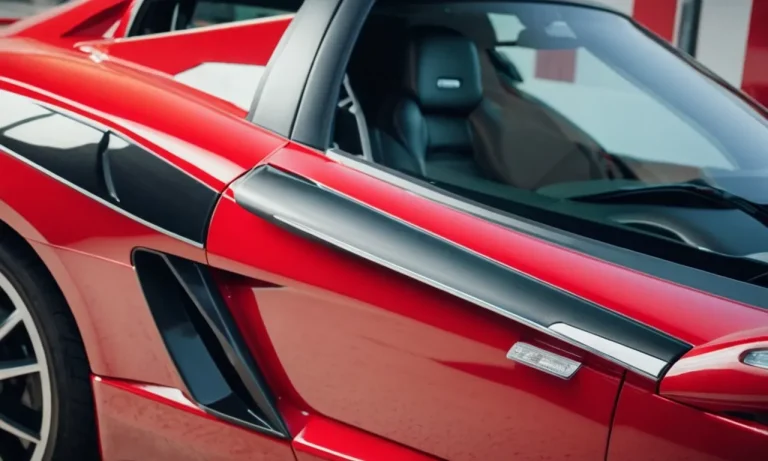Can A Garage Door Opener Be Too Powerful?
Getting a garage door opener that’s too powerful can lead to problems like damage to your garage door or even injuries. Most homeowners want an opener that’s strong enough to lift their door smoothly but not overly powerful.
If you’re short on time, here’s a quick answer to your question: The horsepower rating of most residential garage door openers ranges from 1/2 HP to 1-1/2 HP. This is usually sufficient for properly balanced doors up to 350 pounds.
Going with a model rated higher than 1-1/2 HP could lead to issues if your door is lightweight.
In this comprehensive guide, we’ll look at garage door opener power ratings, explain what factors impact how much power you need, discuss potential problems with overpowered openers, and provide tips for selecting the right garage door opener for your home.
Understanding Garage Door Opener Power Ratings
When it comes to choosing the right garage door opener, understanding power ratings is crucial. The power of a garage door opener determines its ability to lift the weight of your garage door. It is important to find the right balance between power and efficiency to ensure smooth operation and avoid any potential damage.
Horsepower Ratings
Horsepower (HP) is the most common power rating used for garage door openers. The higher the horsepower, the more powerful the opener. Most residential garage door openers typically come in three power ratings: 1/3 HP, 1/2 HP, and 3/4 HP.
Smaller doors with less weight can be operated with a 1/3 HP opener, while larger and heavier doors may require a 3/4 HP opener for optimal performance.
It’s important to note that higher horsepower doesn’t necessarily mean better performance. If your garage door is properly balanced and maintained, a 1/2 HP opener can often be sufficient for most residential applications.
However, if you have an oversized or heavily insulated door, a higher horsepower opener may be necessary to compensate for the additional weight.
Lifting Capacity
In addition to horsepower, garage door openers are also rated based on their lifting capacity. This rating indicates the maximum weight that the opener can handle. The lifting capacity is usually measured in pounds and is an important consideration when selecting a garage door opener.
Most residential garage door openers have a lifting capacity between 300-600 pounds. However, if you have a particularly heavy garage door, such as a solid wood or steel door, you may need to look for a higher lifting capacity opener.
It’s essential to ensure that your opener can handle the weight of your door to prevent strain on the motor and avoid potential damage.
Other Power Measurements
While horsepower and lifting capacity are the primary power measurements for garage door openers, there are a few other factors to consider. These include torque, speed, and voltage.
- Torque: Torque refers to the twisting force generated by the opener’s motor. A higher torque can help the opener handle heavier doors more effectively.
- Speed: The speed at which the garage door opens and closes is also an important consideration. Faster door openers can provide convenience and save you time.
- Voltage: Garage door openers typically operate on 120V AC power, but some high-powered models may require 240V AC power.
It’s worth noting that each manufacturer may have different power ratings and specifications for their garage door openers. When choosing an opener, it’s recommended to consult the manufacturer’s guidelines and specifications to ensure compatibility with your specific garage door.
For more information on garage door opener power ratings, you can visit https://www.liftmaster.com/ or https://www.geniecompany.com/.
What Impacts the Power You Need
When it comes to garage door openers, having the right amount of power is crucial for smooth and efficient operation. However, it’s important to understand what factors impact the power you need for your specific garage door. Let’s take a closer look at some of these factors:
Door Size and Weight
The size and weight of your garage door play a significant role in determining the power required for your opener. Larger and heavier doors will typically require more power to operate smoothly. For example, a double garage door made of solid wood will require more power than a single aluminum door.
Door Balance
The balance of your garage door is another important factor to consider. If your door is not properly balanced, it can put additional strain on the opener. A door that is too heavy on one side or not properly aligned can make the opener work harder, which may result in premature wear and tear.
It’s important to ensure that your door is properly balanced before selecting a garage door opener.
Type of Door and Track
The type of door and track system you have can also impact the power requirements for your opener. Different types of doors, such as sectional, roll-up, or tilt-up, may have different power needs. Additionally, the track system, such as a standard track or a low-headroom track, can also affect the power required.
It’s important to consider these factors when choosing the right opener for your garage door.
Frequency of Use
The frequency of use is another important factor to consider when determining the power needed for your garage door opener. If you use your garage door frequently, such as in a busy household or a commercial setting, you may need a more powerful opener to handle the increased demand.
On the other hand, if you only use your garage occasionally, a less powerful opener may be sufficient.
It’s worth mentioning that consulting with a professional garage door installer or contacting the manufacturer of your specific garage door can provide valuable insights and recommendations regarding the power requirements for your garage door opener.
Potential Problems With Overpowered Openers
While having a powerful garage door opener may seem like a great idea, there can actually be some potential problems that arise from using one that is too powerful. It’s important to understand these issues to ensure the safety and longevity of your garage door system.
Damage to Lightweight Doors
One of the main problems with an overpowered opener is that it can cause damage to lightweight garage doors. If your garage door is made of lightweight materials such as aluminum or fiberglass, the excessive force exerted by a powerful opener can lead to dents, cracks, or even complete structural failure.
This can result in costly repairs or the need for a full replacement of your garage door.
Safety Hazards
Another concern with using an overly powerful opener is the potential for safety hazards. Garage doors are equipped with safety sensors that detect obstructions and prevent the door from closing if something is in its path.
However, an opener with too much power can override these sensors, posing a risk to people or objects that may be in the way. This can lead to accidents or injuries, making it crucial to choose an opener that is appropriate for the weight and size of your garage door.
Noisy Operation
An overpowered opener can also result in noisy operation. The excessive force exerted by the opener can cause the garage door to slam shut or open forcefully, causing loud banging or clanging noises. This can be disruptive and bothersome, especially if you have living spaces adjacent to the garage.
Additionally, the constant strain on the garage door components due to the excessive force can lead to premature wear and tear, resulting in the need for frequent repairs or replacements.
Premature Wear
Using an opener that is more powerful than necessary can cause premature wear on various components of your garage door system. The additional strain placed on the springs, cables, tracks, and other hardware can cause them to wear out faster than usual.
This can result in more frequent maintenance and repairs, increasing your overall expenses in the long run. It’s important to choose an opener that matches the weight and size of your garage door to ensure optimal performance and longevity.
Remember, it’s always best to consult with a professional garage door technician who can assess your specific needs and recommend an opener that is suitable for your garage door. They can provide expert advice and guidance to help you avoid the potential problems that may arise from using an overpowered opener.
Tips for Choosing the Right Power Opener
When it comes to garage door openers, finding the right power opener is crucial for efficient and safe operation. While having a powerful opener can be beneficial, there is such a thing as having too much power. Here are some tips to help you choose the right power opener for your garage door:
Consider Your Door’s Size and Weight
Before selecting a power opener, it’s important to consider the size and weight of your garage door. Different doors require different amounts of power to operate smoothly. If you have a heavy or oversized door, you’ll need a more powerful opener to handle the load.
On the other hand, if you have a smaller, lightweight door, a less powerful opener will suffice.
Have a Balanced Door
Before installing a power opener, make sure your garage door is properly balanced. A balanced door reduces strain on the opener and ensures smooth and efficient operation. If your door is unbalanced, it may require more power to open and close, putting unnecessary strain on the opener and potentially shortening its lifespan.
Choose a Mid-Range HP Rating
When it comes to power ratings, it’s generally recommended to choose a mid-range horsepower (HP) opener. A ½ or ¾ HP opener is usually sufficient for most residential garage doors. This provides enough power to operate the door smoothly without being overly powerful.
Having a power opener that is too strong can lead to excessive wear and tear on the garage door’s components.
Get Help Choosing
If you’re unsure about which power opener to choose, it’s always a good idea to seek professional advice. Garage door technicians have the expertise and knowledge to assess your door’s requirements and recommend the right power opener for your specific needs.
They can take into account factors such as the door’s size, weight, and balance to ensure you select the most suitable opener.
Remember, having the right power opener is essential for the safe and efficient operation of your garage door. By considering your door’s size and weight, ensuring it is properly balanced, choosing a mid-range HP rating, and seeking professional advice when needed, you can ensure that your garage door opener is neither too weak nor too powerful.
Conclusion
The power rating you need for your garage door opener depends primarily on having a properly balanced door. In most cases, a opener in the 1/2 to 3/4 HP range provides adequate lifting force without being overly powerful.
To prevent problems, have your door serviced if needed and avoid going with the highest horsepower opener available. With a properly sized and adjusted opener, you’ll enjoy smooth, trouble-free garage access for years to come.







